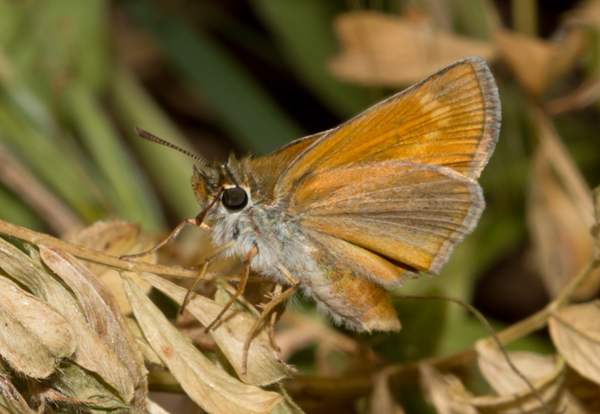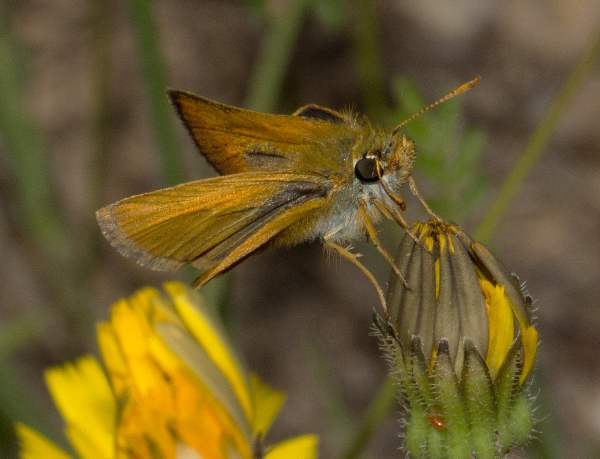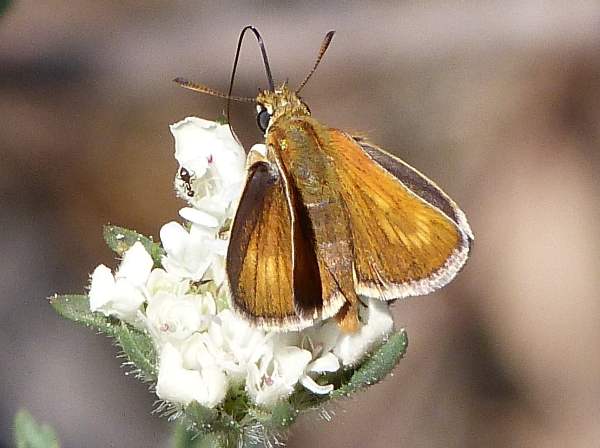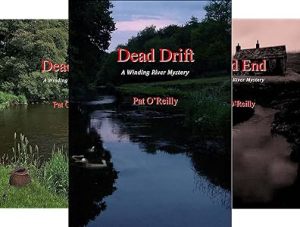Lulworth Skipper Butterfly - Thymelicus acteon
Phylum: Arthropoda - Class: Insecta - Order: Lepidoptera - Family: Hesperiidae

The Lulworth Skipper is a very small butterfly of calcareous downland and coastal grassland.
Description
The male has a wingspan of 24 to 27mm, while the slightly larger females have wingspans of 25 to 28mm. The darkish dun-coloured wings are tinged with olive-brown - most noticeably so with the males. The forewings of females are marked with a circular 'sun-ray' pattern of golden marks. Where males have such markings they are duller and much more faint.

Distribution
In Britain this butterfly is limited to the Dorset coast. Its common name refers to Lulworth Cove, in Dorset, where the first British sighting was recorded in 1832. Elsewhere the Lulworth Skipper is common throughout much of central and southern Europe and in North Africa; its range extends eastwards across the Mediterranean and into the Middle East.

Lifecycle
The larval foodplant of the Lulworth Skipper is tall patches of Tor-grass Brachypodium pinnatum. Female Lulworth Skippers lays their eggs inside grass sheathes during late July and August. The caterpillars emerge, spin a coccoon and then go into hibernation until late April. After eating its way out of the coccoon, the caterpillar feedsand grows until early June, when it pupates for about two weeks. The adults emerge in late July.
Small Skipper butterflies take nectar from many kinds of meadow wildflowers including Bird's-foot Trefoil, knapweeds (Knautia spp) and many other thistles.
Acknowledgements
This page includes pictures kindly contributed by Rob Petley-Jones.
Studying butterflies and moths...
Excited at the prospect of flyfishing? So are we, and we're pretty sure you would find the Winding River Mystery trilogy of action-packed thrillers gripping reading too. Dead Drift, Dead Cert, and Dead End are Pat O'Reilly's latest river-and-flyfishing based novels, and now they are available in ebook format. Full details on our website here...
Buy each book for just £4.96 on Amazon...
Please Help Us: If you have found this information interesting and useful, please consider helping to keep First Nature online by making a small donation towards the web hosting and internet costs.
Any donations over and above the essential running costs will help support the conservation work of Plantlife, the Rivers Trust and charitable botanic gardens - as do author royalties and publisher proceeds from books by Pat and Sue.
